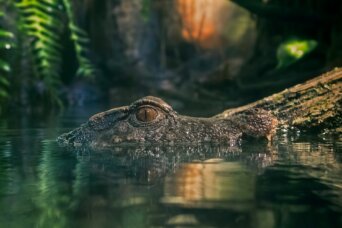- About
- Topics
- Story
- In-Depth
- Picks
- Opinion
- News
- Donate
- Signup for our newsletterOur Editors' Best Picks.Send
Read, Debate: Engage.
| topic: | Conservation |
|---|---|
| located: | China |
| editor: | Amy Liu |
"Have the fish been caught?" Netizens of central China’s Henan province expressed their concern after a strange species of fish was reportedly discovered at the Central Park of Ruzhou. The striking fish was later identified as alligator gar, a high-risk invasive species, alien to the region, and was eventually captured before an audience of over 37 million online viewers.
According to the video, the fish is 80 centimetres long and has a dark black body with patterns, a large mouth and long fangs. The experts quickly identified it as an alligator gar, which has no natural predators and may pose a serious threat to the ecological environment.
"An alligator gar is a massive carnivorous fish. It has no natural enemies in our country's waters. It has a ferocious temperament and high fecundity and survivability. It primarily hunts fish in the water, and its food intake is also impressive,” said Gu Dangen, associate researcher at the Chinese Academy of Fishery Sciences' Pearl River Fisheries Research Institute (PRFRI). “If the alligator gar is mixed into the breeding waters, the farmers will lose everything."
After recognising the gravity of the situation and following several failed captures, the park decided to drain the lake rather than use large nets in the future. Over 200,000 cubic metres of lake water were removed. Finally, two strange fishes measuring 70 and 90 centimetres were discovered and rendered harmless last Saturday.
However, reports of this massive fish have come in from more than six Chinese provinces or cities, including Beijing and Jiangsu. The alligator gar lives primarily in North America and was later introduced to China as an ornamental fish. As a result, officials questioned whether they were released into the park waters by a previous owner.
On 1 August, the Administrative Measures for Invasive Alien Species was officially issued and implemented. It is China’s first management method for the prevention and control of invasive alien species. The measure points out that anyone who introduces, releases or discards alien species without approval will be punished. Nevertheless, the measure does not go far enough to specify whether it is illegal for individuals to engage in captive breeding.
After the measure was issued, several news outlets began to reveal that merchants were selling alligator gar on e-commerce platforms for hundreds of RMB, one of whom revealed that the fish are raised in Guangzhou.
Some religions believe that releasing species helps accumulate merit and virtue. Yet the business of capturing and releasing exotic creatures harms the environment and endangers ecosystems. There are even whole teams that specifically catch large numbers of birds, fishes or turtles with the purpose of selling them and which are eventually released into non-native habitats after their purchase. Many of these animals are killed during the capture, transport or release processes.
The administrative measure is a step towards controlling the introduction of alien species, but there is still a long way to go in terms of reviewing law enforcement by local authorities and educating the public about the dangers of releasing such species.
Photo by Robert Zunikoff

